Physical Address
304 North Cardinal St.
Dorchester Center, MA 02124
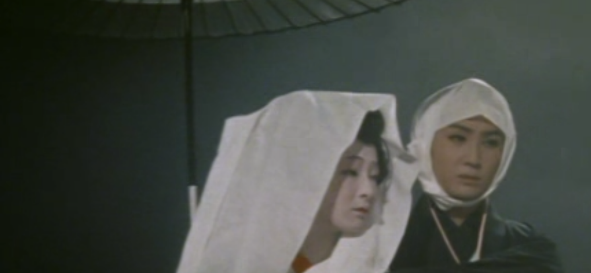
(Continued from Page 1)
“Art is something that lies in the slender margin between the real and the unreal.”
‒ Chikamatsu Monzaemon, as quoted by Confucian scholar Hozumi Ikan in his book Naniwa miyage (1738)
For his second and final adaptation of a Chikamatsu work, following The Horse Boy (Abarenbo kaido, 1957), Uchida pulled out all the stops. For the leads, he cast the photogenic rising stars Nakamura Kinnosuke and Arima Ineko, with both of whom he had worked previously. He brought back Kataoka Chiezō for the small but very memorable part of the playwright Chikamatsu. (In the following year, Uchida would reward Kataoka with what may have been the greatest role of his life: Jirō in Hero of the Red-Light District.) He obtained the services of one of the recently-deceased Mizoguchi Kenji’s first-rate screenwriters, Narusawa Masashige, plus a team of top craftsman, and hired one of the strongest supporting casts of his career.
But of course, cinema history is littered with the dead hulks of ambitious projects with major talent that, on paper, should have worked but somehow never jelled onscreen. To the extent that this film succeeds as cinema – and I think it’s almost entirely successful – I believe that this is due to the fact that Uchida adapted the playwright’s ancient work not as a revered classic, but as if it were a brand-new play. (As theater scholar A.C. Scott points out, plays such as this one, part of the genre known as sewamono, although now considered historical, “were the last word in contemporary social commentary when Chikamatsu first set a vogue for them.”1) Uchida clearly felt that this work about love and greed was very relevant to 1950s Japan. Certainly, the controlled rage that lies just below the film’s surface suggests that the narrative elicited very fresh and strong emotions in the director, feelings he was, fortunately, able to communicate cinematically.
The fact that Osaka is present in the movie’s original title (under its ancient name, “Naniwa”) suggests that the city’s unique place within Japanese culture is to be emphasized – and critiqued. Osaka was and is the commercial capital of Japan, as Kyoto is the cultural capital and Tokyo (formerly known as Edo) the political capital. In old Osaka in the 18th Century, as Uchida depicts it, merchants and their commercial houses ruled and money was king, making it the ideal setting to explore the related business of prostitution. The closest Western analogy would probably be Holland during its Golden Age, in which rich merchants were regularly depicted in paintings by the great Dutch masters as avid customers of the sex trade, as if that were a natural extension of their day jobs.
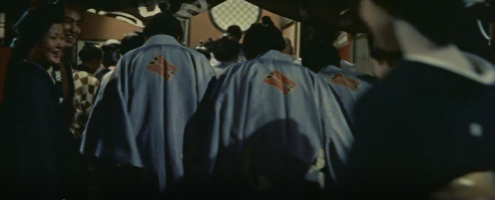
There is a simply-conceived but very clever shot early in the film in which the magnate, Tobei, enters Tsuchiya Jiemon’s brothel, and Uchida has the camera follow directly behind him and his entourage. In this way, the audience is immediately enveloped by the seductive bustle of this outwardly glamorous world.
The narrative’s tragic irony is that the protagonists, the prostitute Umegawa and the courier Chubei – based on an actual couple that fled from the law in 1710, who will forever be linked in literary memory to Osaka’s notorious “floating world” – are both, as this film depicts them, misfits within that world. The gentle Umegawa loathes her job, but like so many courtesans of the time, must go on working because of family obligations and a seemingly unbreakable contract. Chubei, a conscientious and rather puritanical clerk, is quite literally dragged to Shinmachi, the Osaka pleasure quarter, by his overbearing client Hachi, whom he doesn’t really like but would prefer not to offend.
The online critic for the blog Japanonfilm finds Chubei’s shyness and naïveté, as the actor portrays it, utterly implausible. I suppose that if Chubei had been born and raised in Osaka, his behavior would indeed be unlikely, but the blog’s writer apparently forgets that the courier is really just a country boy. He was brought up with more conservative values than the freewheeling city-dwellers among whom he now works and lives, which is one reason why he gets along so well with his sister/fiancée Otoku, who is similarly straitlaced and serious-minded.
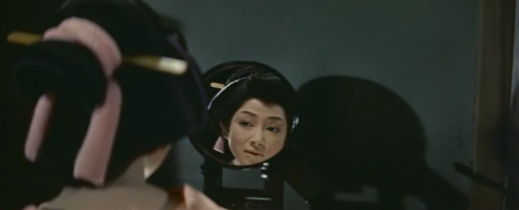
So if, on his initial trip to Tsuchiya Jiemon’s brothel, Chubei had ended up with Chiyozo, the pretty but vacuous courtesan that Hachi himself chose, he surely would have never made a second trip to the pleasure quarter. It’s entirely by chance, because she happens to be free at the very moment he arrives, that the beautiful, compassionate and lovable Umegawa gets assigned to this new, young client. So Chubei hits the jackpot – and draws the short straw at the same time, because this fateful encounter will destroy his life.
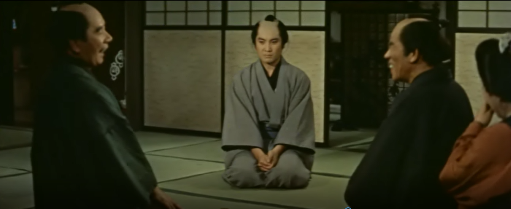
It’s an intriguing question whether love or ego motivates Chubei’s desperate transgression, a crime the dread punishment for which he, more than anyone, knows he can’t possibly escape. Chubei is obsessed with proving himself a man, and Uchida strongly emphasizes how the mockery of the magnate and the brothel proprietors enrages Chubei and incites him beyond all reason. But it would be too much, I think, to claim that it’s merely vanity rather than love that compels him.
In this regard, a seemingly trivial but important scene is the one in which the courier, on the night before he is to travel to Edo, waits for Umegawa in the courtesan’s room and finds there an unfinished draft of a letter to her mother, in which she mentions the five ryō she’d recently given her for medicine. Despite his own poverty, Chubei is moved to leave behind five ryō – and then departs before the courtesan returns, not seeking any sexual recompense for his generosity. As Uchida makes clear, it’s their shared capacity for compassion that most strongly binds Umegawa and Chubei.
Keiko I. McDonald has pointed out that in the original Bunraku play “Chubei is pretty much a ‘type’ of young debauchee; his modern counterpart [in the film] displays more sensitivity.”2 McDonald cites as an example the purchase of the comb for Umegawa, which he sends her from Edo. It is for him merely a symbol that he wishes to break up with her and move on, but a gracious and elegant one: a way to “let her down easy.” But Umegawa has gone too far in her love to turn back (as has Chubei, though he doesn’t yet realize it), and she is heartbroken by the gift.
The saddest irony of the film is that, despite Chubei’s inherent kindness, he destroys all he touches. Umegawa at the end is much worse off than before they met; his adoptive mother is ruined and his “sister” heartbroken; and his biological family is disgraced by his crime. (Only the villainous characters — Jiemon, Hachi and Tobei — are essentially untouched by Chubei’s actions.) But Uchida’s point is that the calamitous outcome of his ninjo-giri (desire vs. duty) conflict would never have occurred in a just system, but is inevitable in one in which money is, literally, all that matters.
As the original title of the play, The Courier for Hell, implies, in Chikamatsu’s eyes Chubei cannot be forgiven for his transgression against the social order, even if he did it all for love. But in Uchida’s adaptation, it’s the social order itself that is unforgiven.
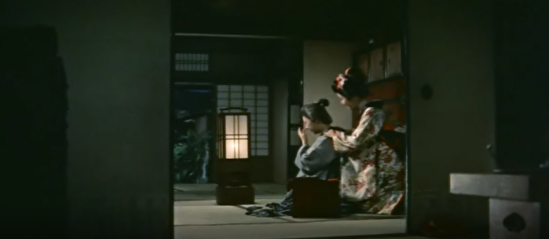
A conventional artist would have portrayed the merchants’ milieu and that of the brothel as antithetical worlds, but Uchida shrewdly creates subtle correspondences between the two. At the Kameya House, Otoku volunteers to massage her worried mother’s shoulders, and in the very next scene, we see Jiemon, the brothel proprietor, getting his own neck and shoulders massaged.
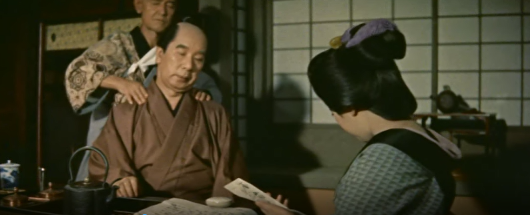
The scene where Jiemon shames Umegawa for requesting a loan of a mere five ryō, by reminding her that her body doesn’t belong to her, is doubled in the very next scene when Myokan, with similar condescension, lectures Chubei on a merchant’s duties, comparing money to a samurai’s sword. In the time-honored tradition of troubled youth in films, the courier and the courtesan seek each other out to escape cruel or uncomprehending elders, a decision which sets them on a collision course with those very same elders.
Although she moves, from the beginning, rather like one of the puppets in Chikamatsu’s theater, Umegawa is depicted as an exceptionally self-aware young woman. With a bitter smile, she calls herself “merchandise,” and declares “money is the enemy,” a line that Chikamatsu, overhearing, likes so much he writes it down for possible future use.
It should be noted that Umegawa’s perception of herself as a commodity is compatible with the Marxist concept of reification, in which people become things for others’ enjoyment, and this is almost certainly no accident, given Uchida’s longtime familiarity with left-wing thought. (He had studied Communism in the prewar era, and of course he’d lived and worked in Maoist China, where he’d been forced to participate in ideological study groups.) In this way, the director slyly provides a perspective on the characters beyond what their original creator could possibly have conceived.
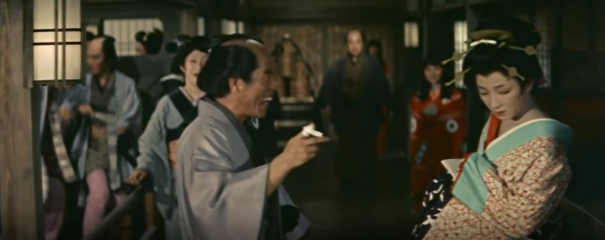
The characters representing the world of wealth and position at the center of Osaka’s culture are remarkable both for their repulsiveness and their utter indifference to that fact. The vulgar magnate Tobei (well-played by the great character actor Tōno Eijirō) inspires such loathing in Umegawa that it’s a wonder she doesn’t throw up in front of him. Yet he’s not unaware of her disdain. Rather, he simply doesn’t care that she despises him, and in the world of Osaka, where wealth is the only morality, he doesn’t need to care.
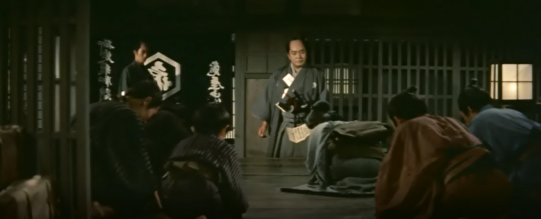
When a shipment of 300 ryō that the Yonagos, a particularly haughty and violent samurai clan, have ordered from Edo is late in arriving, a samurai shows up at Myokan’s establishment and threatens to cut off Chubei’s head if the clan doesn’t get its money as soon as possible. Humility, deference, restraint: in feudal society, these very Japanese virtues are reserved for the poor alone; for people like the magnate or the Yonagos, they are neither necessary nor desirable. So when Chubei, learning from his arrogant betters, at last asserts himself by taking Umegawa, fraudulently, as his wife, he has to be destroyed.
(Continued on Page 3)
[…] in this film, she starred in The Body (Ratai), directed by Uchida screenwriter Narusawa Masashige (Chikamatsu’s Love in Osaka). She also appeared in the final installment of Inagaki Hiroshi’s Miyamoto Musashi (a.k.a., […]
[…] Chikamatsu’s Love in Osaka (Naniwa no koi no monogatari; 浪花の恋の物語), 1959 […]
[…] in 1959, right after the final installment of the Great Bodhisattva Pass trilogy, but just before Chikamatsu’s Love in Osaka – quite a busy year for a 61-year-old […]
[…] Police Officer (Keisatsukan, 警察官), 1933A Bloody Spear at Mount Fuji (Chiyari Fuji; 血槍富士), 1955Twilight Saloon (Tasogare Sakaba; たそがれ酒場), 1955Chikamatsu’s Love in Osaka (Naniwa no koi no monogatari; 浪花の恋の物語), 1959 […]
[…] over 250 film and TV credits over six decades. For Uchida, he would later appear in Dotanba (1957) Chikamatsu’s Love in Osaka (1959), The Master Spearman (1960) and the fourth installment (1964) of the five-part Miyamoto […]
[…] Police Officer (Keisatsukan, 警察官), 1933A Bloody Spear at Mount Fuji (Chiyari Fuji; 血槍富士), 1955Twilight Saloon (Tasogare Sakaba; たそがれ酒場), 1955Chikamatsu’s Love in Osaka (Naniwa no koi no monogatari; 浪花の恋の物語), 1959 […]
Hey, I think your mostly on target with this, I wouldnt say I totally agree , but its not really that big of a deal .
Based on your comments, I assume you’ve seen the film. Just out of curiosity, though you say it’s not a big deal, what precisely don’t you agree with?